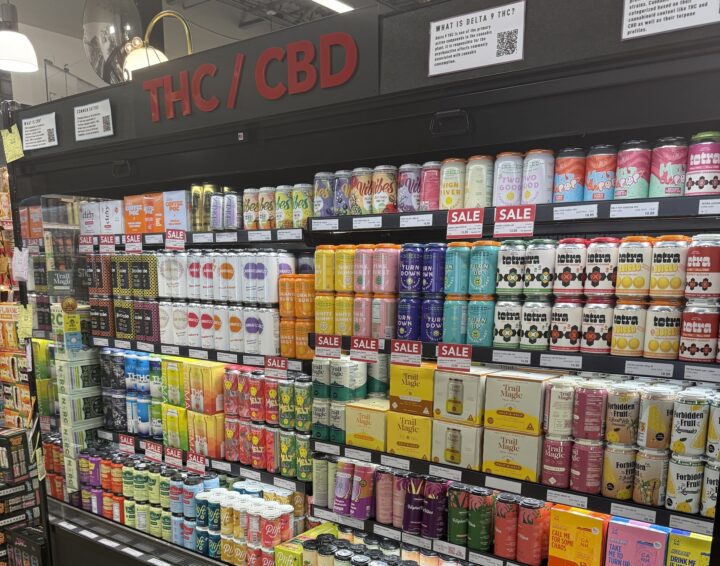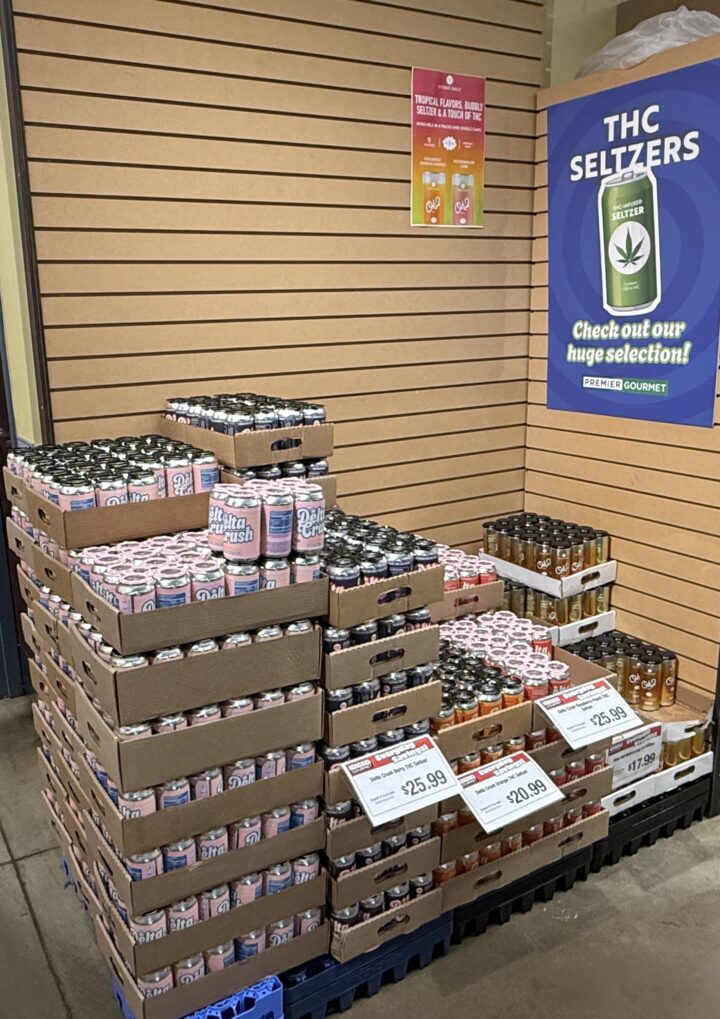
This summer, hemp-derived THC-infused beverages are flying off the shelves in the 20-plus states where they’re legal. “I started selling THC drinks spring of 2024, but they really have started to take off this summer,” says Vince Liotta, owner of the three-unit Sal’s Beverage World in the Chicago suburbs. “From May 1st to July 15th, the category is up over 2,000%.”
Sal’s carries more than 60 THC beverage SKUs, which are stacked on an endcap and featured in a section of the beer department. They’ve been promoted in the store’s weekly online ad. Liotta observes that THC beverage consumers generally range in age from 21 to 65. “Some older folks have told me it helps them with their arthritis and back pain,” he says.
Top-sellers include Gigli THC Seltzer 10mg ($18 a four-pack of 12-ounce cans) and 5mg ($17) and Wynk Variety Pack 5mg ($38 a 12-pack of 12-ounce cans). “The variety four- and 12-packs sell the most,” Liotta says. “The main categories hurting the most are wine and domestic beer. Those drinkers are looking for alternatives.” Liotta anticipates THC beverage sales to continue growing for the foreseeable future. “I don’t think this is going to be a cyclical category where it will just drop off,” he says. “In the future, I believe it will even sell better than hard seltzers.”
The U.S. market for hemp-derived THC drinks is rapidly growing. In 2020, it was $400,000, and last year it reached $382 million, according to the consumer insight and market research firm Brightfield Group. For 2025, the market is expected to approach $600 million. Hemp-derived THC drinks face regulations on a state-by-state basis and potential federal restraints if the U.S. Congress closes a loophole in the Agricultural Improvement Act of 2018. Also known as the 2018 Farm Bill, the measure established a distinction between hemp (0.3% or less THC by dry weight) and marijuana (more than 0.3% THC) and removed hemp from the list of controlled substances, even though it may contain other psychoactive cannabinoids.

While New York liquor stores are prevented from selling non-alcoholic beverages, retailers with the appropriate cannabis license are selling THC drinks. “We started selling hemp THC beverages when they became legal in 2021,” says Mark Notarius, co-owner of specialty grocer Premier Gourmet in Amherst, New York. “Sales so far this summer are about 2.5 times what they were this time last year.”
Premier Gourmet carries about 40 THC beverage SKUs, and that number is expected to increase 30%-40% by the end of the year. “Many of our THC beverage customers have either cut down their beer consumption or quit altogether,” Notarius says. “We get people from 21 up to 80 years old. This category seems to perform especially well among millennials and baby boomers.”
The three top-selling THC beverage brands at Premier Gourmet are Cycling Frog ($21 a six-pack of 12-ounce cans), Delta Crush ($21-$26 a six-pack), and Brez Amplify ($20 to $23 a four-pack of 12-ounce cans). “Our craft beer sales have declined a bit over the past couple years,” Notarius says. “Based on the huge increase in hemp THC beverage sales, we know these products are taking away from alcohol sales, including beer.”
Notarius has done little advertising for THC beverages but is beginning to use targeted Google ads. “The brands are on social media — they can tag us,” he notes. “Our plan is to make people seeking these brands aware we sell them.” Notarius anticipates that THC beverage sales will continue increasing at a high rate. “We expect the same year-over-year growth continuing well into next year,” he says.
Minnesota liquor stores have been selling THC beverages since they became legal June 1st, 2023. The market is booming. “We started selling THC as soon as the law passed and we were allowed,” says Melissa Surdyk, owner of Surdyk’s Liquor & Cheese Shop in Minneapolis. “Sales have been good this summer with increased varieties available.”
Surdyk’s carries 212 THC items, and the inventory continues growing. Top-selling THC beverage brands include Trail Magic Half & Half 10mg THC ($17 a four-pack of 12-ounce cans) and Indeed Double High Fiver Pink Burst 10mg THC 10mg CBD ($20 a four-pack of 12-ounce cans). While all demographics appear interested in THC products, Surdyk sees an increase in the older population beginning to consume. “Many consumers enjoy the specific varieties promoting ‘sleep’ and/or an ‘active’ experience,” she says.
THC beverages are promoted at Surdyk’s with in-store tastings and catchy displays. Another big seller is Surdyk’s-branded Happy Gummies Strawberry 10mg THC two servings per gummy five pack ($20). “Most of our THC consumers purchase in all categories,” Surdyk says. “We’ve seen a lift in NA and THC products when consumers switch or take a break from alcohol.”
Surdyk expects THC beverage brands, flavors, and 12-pack offerings to increase. “Consumers are acting on flavor, effects, and price, whichever they value most,” she says. “(Legal) changes could make it more difficult for some producers. However, the motivated ones will make it work with any new rules or regulations. The space is so competitive — the best of the best is what’s selling and what Surdyk’s stocks.”